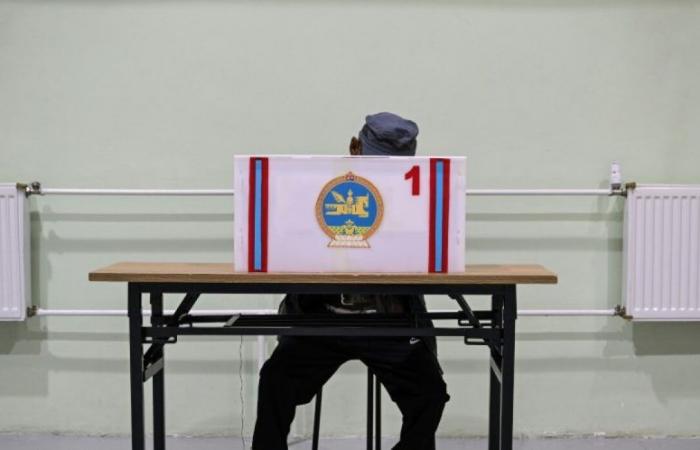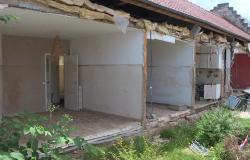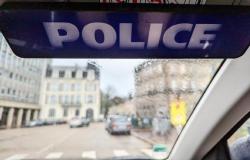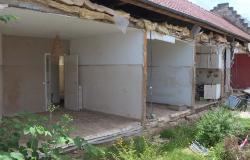The Mongols vote on Friday June 28 for legislative elections after which the ruling party should retain its majority, despite weariness with the feeling of corruption and the economic situation. Polling stations in the capital Ulaanbaatar will close at 10:00 p.m. (14:00 GMT). Despite the immensity of the country – three times the size of France – the preliminary results should be known fairly quickly, during the night, thanks to the electronic voting system.
The voters of this sparsely populated state (3.4 million inhabitants) compared to its Chinese and Russian neighbors, but rich in natural resources, elect 126 members to the national Parliament, the Great State Khural. The ruling Mongolian People’s Party (PPM), led by Prime Minister Luvsannamsrain Oyun-Erdene, is expected to retain the majority it has enjoyed since 2016 and remain in power for four more years.
Mongolian Prime Minister Luvsannamsrain Oyun-Erdene (3rd right) waits to cast his vote in the Mongolian legislative elections outside a polling station in Ulaanbaatar, the capital of Mongolia, on June 28, 2024 – Byambasuren BYAMBA-OCHIR – Ulaanbaatar (AFP)
Purchasing power. But concerns remain about purchasing power being undermined by inflation (it currently stands at 7%) and the sense among many Mongolians of widespread corruption. At a polling station in the suburbs of Ulaanbaatar, Tsagaantsooj Dulamsuren, a 36-year-old cashier who is pregnant with her fourth child, told AFP that she expected politicians to “further develop infrastructure” and “create more manufacturing jobs for young people”.
The sale of alcohol in the capital is banned until Saturday, to avoid disrupting the smooth running of the elections. In a polling station in the rural region of Sergelen, an administrative division located more than an hour’s drive from the capital, a 45-year-old official, Batsaikan Battseren, regrets the low participation of young people. “Young people aged 18 to 30 are not going to vote,” notes this former breeder, dressed from head to toe in traditional Mongolian clothing.
In the streets of Ulaanbaatar, where half of the Mongolian population lives, the countless electoral propaganda posters represent the entire political spectrum, from liberals to nationalists, including populist businessmen and environmentalists. In Mongolia’s largely male-dominated political world, parties are required by law to ensure that 30 percent of their candidates are women.
Small parties. The campaign ended on Wednesday, with the PPM holding a triumphant rally in the small town of Zuunmod, where it promised voters that it would win “victory for the people.” The inability of the main opposition movement, the Democratic Party, to offer a credible alternative has fueled the rise of smaller parties.
Among them is the anti-corruption center-right HUN party, which is expected to increase its number of MPs. Its candidates, comfortable with social media, enjoy strong support among the urban middle classes. At Wednesday’s rally, Prime Minister Luvsannamsrain Oyun-Erdene accused his political opponents of turning Mongolia into a “country of corrupt leaders” and called for a return to “discipline.”
During his tenure, however, the country has fallen sharply in Transparency International’s Corruption Perceptions Index. Critics of the government say press freedom and the rule of law have also declined in recent years. So much so that, according to the Sant Maral Foundation, the country’s leading independent pollster, more than a third of Mongolians now believe the country is “turning into a dictatorship.”
“Referendum ». “I would describe this election as a referendum for or against (…) Prime Minister Oyun-Erdene” and for or against “a rewriting of Mongolia’s social contract,” political analyst Bayarlkhagva Munkhnaran told AFP. “This (new) social contract aims to transform Mongolia into a true electoral autocracy. Whereas just 10 years ago, Mongolia was respected as a liberal democracy,” he explains.
Considered the successor to the Communist Party which governed the country with an iron fist for nearly 70 years, the PPM nevertheless remains popular, particularly in the countryside and among seniors. “Their power of attraction is to say: ‘look, we did our job well, we managed everything well’”, explains to AFP Julian Dierkes, professor at the University of British Columbia (Canada ) and specialist in Mongolian politics.
As for the opposition, “everyone says: ‘we want to bring something new, we want to replace (those in power)’, and corruption plays a big part in that,” but “that’s what all the other parties are saying,” he emphasizes. “We’ll know tonight to what extent this has affected the voters,” he adds.
Oliver HOTHAM and Khaliun BAYARTSOGT
© Agence France-Presse






